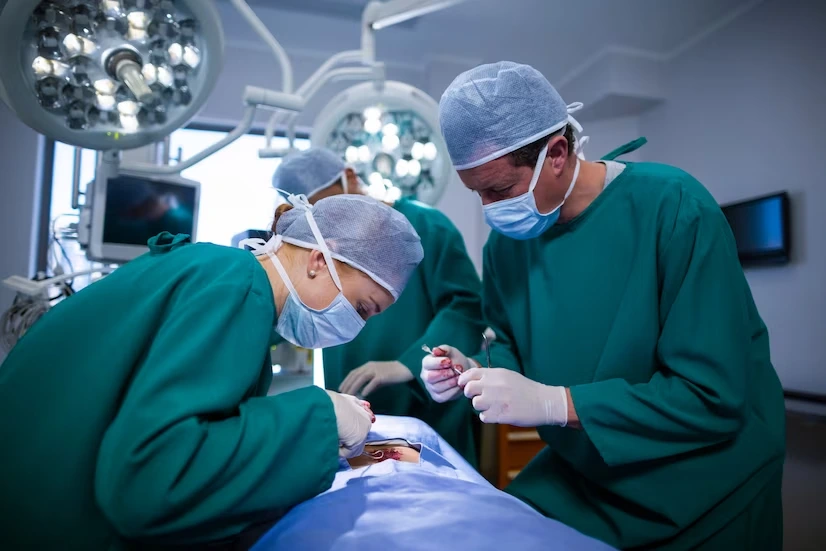Unfortunately, hernias recur in many patients, regardless of the repair method, whether with mesh or without. Consequently, this recurring issue instils a common fear among patients that hernias will come back. Notably, hernia repair treatment typically involves muscular reconstruction, often utilising mesh to reinforce the weakened area, but its success ultimately depends on individual patient factors; furthermore, there’s still a lingering chance of hernia recurrence. In this article, we’ll explore treatment options for recurrent hernias and related procedures.
Table of Contents
ToggleTreatment Options for Recurrent Hernias
Hernia recurrence after surgery can occur due to personal factors such as being overweight, excessive alcohol consumption, having diabetes, or placing too much strain on the abdominal wall. Additionally, incorrect surgical techniques, improper mesh placement, or complications from previous repairs are common causes of recurrence. Treatment should be individualized, taking into account factors such as symptom severity, the patient’s general health, and the size of the hernia to determine the most appropriate course of action.”
Surgical Treatment for Recurrent Hernia
Open Repair Surgery
Open repair is one of the earliest methods where one single incision is performed for gaining access to the hernia. The hernia sac either could be removed or repaired with a mesh added for strength. It is suitable only for smaller hernias.Laparoscopic Surgery
Laparoscopic operation is usually done with three or two small incisions; thus, there is little scar tissue and injuries to the body. A camera guides this repair which results in lesser scarring and speedy recovery.Robotic-Assisted Surgery
Robotic-assisted surgical procedures have better precision and control, thus reducing the size of the incision on the skin and the delicate manner of handling organs to minimise formation of scar and ease the recovery process after surgery.Complex Hernia Repair
Complex hernia repair involves a comprehensive reconstruction of the abdominal wall, using multiple incisions, reinforced tissues, and strategically placed advanced mesh to ensure long-term strength and stability for more severe or recurrent hernias.
Non-Surgical Treatments for Recurrent Hernia
Although surgery is often recommended for recurrent hernias, some patients may not need immediate surgery and can manage the condition on their own. Those with minimal pain may benefit from non-surgical treatments to reduce the hernia, alleviate symptoms, and prevent further complications. For individuals experiencing minimal pain or discomfort, the following options are available.
Lifestyle Modifications:
Physical Therapy and Hernia Support Devices
Hernia Support Devices, combined with Physical Therapy, are some of the recent non-surgical treatments for hernia. There are various accessories available in the market for the sake of hernia such as hernia belts or trusses that could be used under proper guidance.
These devices provide essential support to the abdominal area, relieving pain when worn throughout the day. To strengthen weakened muscles, specific exercises like core tightening, gentle sit-ups, and low-impact activities like dancing can be beneficial.
Physiotherapy treatment can help fix and relieve a patient’s hernia symptoms. To start with, hernia patients have to meet a healthcare professional before engaging themselves in any kind of exercise or treatment session.
Pain Management Techniques:
- Don’t lead your life with excessive physical pain that can trouble your daily activities. You may try taking medicines such as ibuprofen and acetaminophen, if allowed by your doctor. Other alternatives would include acupuncture, acupressure, or body massage to get relief. However, take medications at a moderate level, and ensure sufficient food intake to prevent side effects.
Monitoring and Follow-up Care:
Regular monitoring for recurrent hernia includes tracking symptoms and hernia size, as well as follow-up appointments with your healthcare provider. Imaging tests like ultrasound or CT scans may be ordered to assess hernia size and progression. Your provider will use this information to adjust your non-surgical treatment plan and prevent further complications
Management Strategies for Hernia Cases:
Observation for Asymptomatic Cases
- Monitoring hernia size and growth through regular check-ups and imaging tests
- Watchful waiting for patients with:
- Small hernias (<2 cm)
- Minimal symptoms or no discomfort
- Lifestyle modifications, such as:
- Weight management
- Dietary changes
- Avoiding heavy lifting or straining
- Suitable for patients with small, asymptomatic hernias
Elective Surgical Repair
- Planned surgery to repair hernia before symptoms worsen
- Typically recommended for patients with:
- Medium to large hernias (2-5 cm)
- Growing hernias
- Increasing discomfort or pain
- Impaired quality of life
- Surgical approaches:
- Open repair
- Laparoscopic repair
- Robotic-assisted repair
- Mesh selection based on patient needs and surgeon preference
Emergency Surgical Repair
- Planned surgery to repair hernia before symptoms worsen
- Typically recommended for patients with:
- Medium to large hernias (2-5 cm)
- Growing hernias
- Increasing discomfort or pain
- Impaired quality of life
- Surgical approaches:
- Open repair
- Laparoscopic repair
- Robotic-assisted repair
- Mesh selection based on patient needs and surgeon preference
How to Avoid a Repeat Hernia
- Aim for a healthy BMI to lower hernia recurrence risk
- Engage in regular physical activity to strengthen your core muscles.
Try exercises like planks and leg raises to fortify your abdominal muscles - Lift objects correctly, bending at the knees and using leg muscles
- Avoid straining during bowel movements or urination
- Manage chronic coughing or sneezing
- Follow post-operative instructions carefully
- Attend follow-up appointments with your surgeon
Conclusion
In conclusion, while hernias can be repaired, they have a higher likelihood of individual factors such as obesity, poor diet, genetics and incorrect surgical procedures. Therefore, careful planning and selection of the right treatment are essential. By utilising the techniques mentioned earlier, symptoms and chances of recurrent hernia can be minimised. Although hernias can be expected and painful, preventing them before they occur is important, and leading a healthy lifestyle is a key.
Dr. K. Amilthan MBBS., MS., FMAS., FALS.
Heal Your Hernia Now:
- 20+ Years of Experience
- 1,000+ Surgeries
Your Journey to Wellness Begins with us.
FAQ's
The mesh-based repair surgery, like open or laparoscopic hernioplasty, is largely recommended for recurrent hernias. Such surgery provides extra support and strength to the defect area that reduces further recurrences.
Yes, hernia surgery can be conducted twice in case hernia recurs post the initial repair. It is referred to as revision hernia repair.
To prevent a second hernia, maintain a healthy weight and exercise regularly. Lift objects correctly and avoid straining during bowel movements or urination. A well-proportioned diet rich in fibre, vitamins, and minerals can also help keep your tissues and muscles strong.

Dr. Amilthan
Dr. Amilthan is a renowned laparoscopic hernia surgeon based in Chennai, with over 15+ years of experience in general surgery. He completed his MBBS and MS in General Surgery at Kilpauk Medical College and Government Royapettah Hospital in Chennai.
- All Posts
- Hernia Blog

Which Doctor should you consult for Hernia? You can Consult a general surgeon or a hernia specialist for evaluation and...

A hernia occurs when an organ or any other part of your body pushes through the muscle and surrounding tissue...

An inguinal hernia occurs when the organs push through and bulge against the weak muscles of the abdomen. An effective...

Whether you have a hernia or appendicitis, the main symptom you will experience is stomach pain. So, it might be...

A hernia is a bulge or swelling that happens when an organ or tissue pushes through a weak muscle and...

Hernia Meaning & Hernia Definition The term “hernia” means “rupture” in Latin. A hernia is a condition where an organ or other body...

